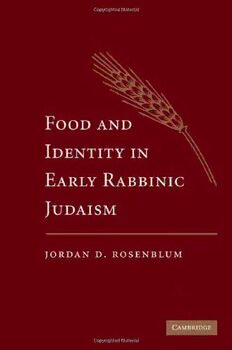
Food and Identity in Early Rabbinic Judaism PDF
238 Pages·2010·1.788 MB·English
Most books are stored in the elastic cloud where traffic is expensive. For this reason, we have a limit on daily download.
Preview Food and Identity in Early Rabbinic Judaism
Description:
Food often defines societies and even civilizations. Through particular commensality restrictions, groups form distinct identities: Those with whom ''we'' eat (''Us'') and those with whom ''we'' cannot eat (''Them''). This identity is enacted daily, turning the biological need to eat into a culturally significant activity. In this book, Jordan D. Rosenblum explores how food regulations and practices helped to construct the identity of early rabbinic Judaism. Bringing together the scholarship of rabbinics with that of food studies, this volume first examines the historical reality of food production and consumption in Roman-era Palestine. It then explores how early rabbinic food regulations created a distinct Jewish, male, and rabbinic identity. Rosenblum's work demonstrates how rabbinic food practices constructed an edible identity.
See more
The list of books you might like
Most books are stored in the elastic cloud where traffic is expensive. For this reason, we have a limit on daily download.
